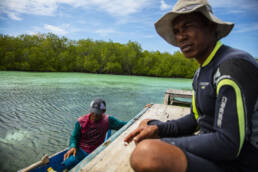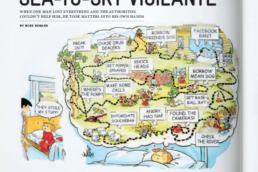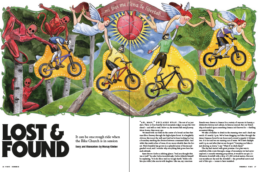Far away, hidden in the vast scatter of islands known as the Indonesian archipelago, Papa Adam sets out from the isolated village of Toropot. It’s already humid and hot as the morning call for prayer rings out at 5 a.m., through a perfect sunrise, across the village of 1,500. Like Papa Adam and his family of four, most villagers live in clapboard shacks with tin roofs, propped on twisted stilts above the crystal-blue waters of the Banda Sea.
The dark and weathered fisherman casts his long handmade wooden fishing skiff off from his dock of sun-faded boards, and lights a smoke. It’s early, but a small flotilla of fishermen head out of the village alongside him. Depending on the wind and weather, Papa Adam will venture far to spear fish or net blue tangs. He breathes underwater using a homemade air compressor and wears a ripped and faded wetsuit and homemade flippers. Papa Adam is Bajua, a line of once-nomadic fishing people dating back thousands of years.
Despite no central electricity, no running water, and no cell service, the community bustles with business: people are building boats, cleaning fish, and packing to transport the fishermen’s wares to bigger centres throughout Indonesia’s complex South Sulawesi region. It strikes me as a poor community, but one where the people are grateful for what they have. Underneath the walkways and homes, schools of soon-to-be-sold aquarium fish dart among bits of plastic waste.
Most in the village seem to smoke. All of their butts tossed into these stunning waters—on which their whole life depends.
The townspeople are visibly healthy and seemingly free from the trappings of the modern world. They sing and laugh and fish. The children are always playing in the water, floating on chunks of styrofoam and old wash buckets. Every day, the men venture to vibrant and healthy coral reefs to fish. They go for days at a time, usually alone. And always, no matter their adventure, they return. They save a little to send their kids to school on the bigger islands, but few kids ever want to leave. They tell me that being on land is foreign, somehow wrong. The sea is their home.
When Papa Adam finishes his smoke, he unceremoniously drops it into the ocean. Most in the village seem to smoke. All of their butts tossed into these stunning waters—on which their whole life depends. I don’t know why. And I cannot judge. It seems to me, no matter where we go, whether we smoke or not, or how connected to this earth we think we are, we’re all tossing our cigarettes into the sea. – Mitchell Scott
Mitchell Scott
Mitchell Scott is the longtime Editor-in-Chief and co-publisher of both Kootenay Mountain Culture and Coast Mountain Culture Magazines. He's been in the writing/publishing/media business for over 20 years and currently lives in Nelson, BC, where he tries to keep up with his two teenage sons with aching futility.
Related Stories
Sea-to-Sky Vigilante
This story first appeared in Coast Mountain Culture's Home Issue, Summer 2013. When Squamish-based photographer Dave…
Canned Veggies: Check Out Fernie’s New Sea-Can Garden
A unique growing system from the Yukon and adopted in the East Kootenay should produce some serious green. By Dave…
Celebrate Your Alter Ego
Editor-in-chief Mitchell Scott explores his other half in this latest Backside Column about all of our alter egos.…
Intercontinental by Sea; Inside a 4,000-mile sea kayak journey from Brazil to Florida
The Henry brothers on B.C.'s Nootka Island. The team's expedition is sponsored by Current Designs, Kokatat, Werner,…
A Beautiful Blizzard
We all love a good snow storm. This short film captures the essence of the big one like no other we've ever seen…






